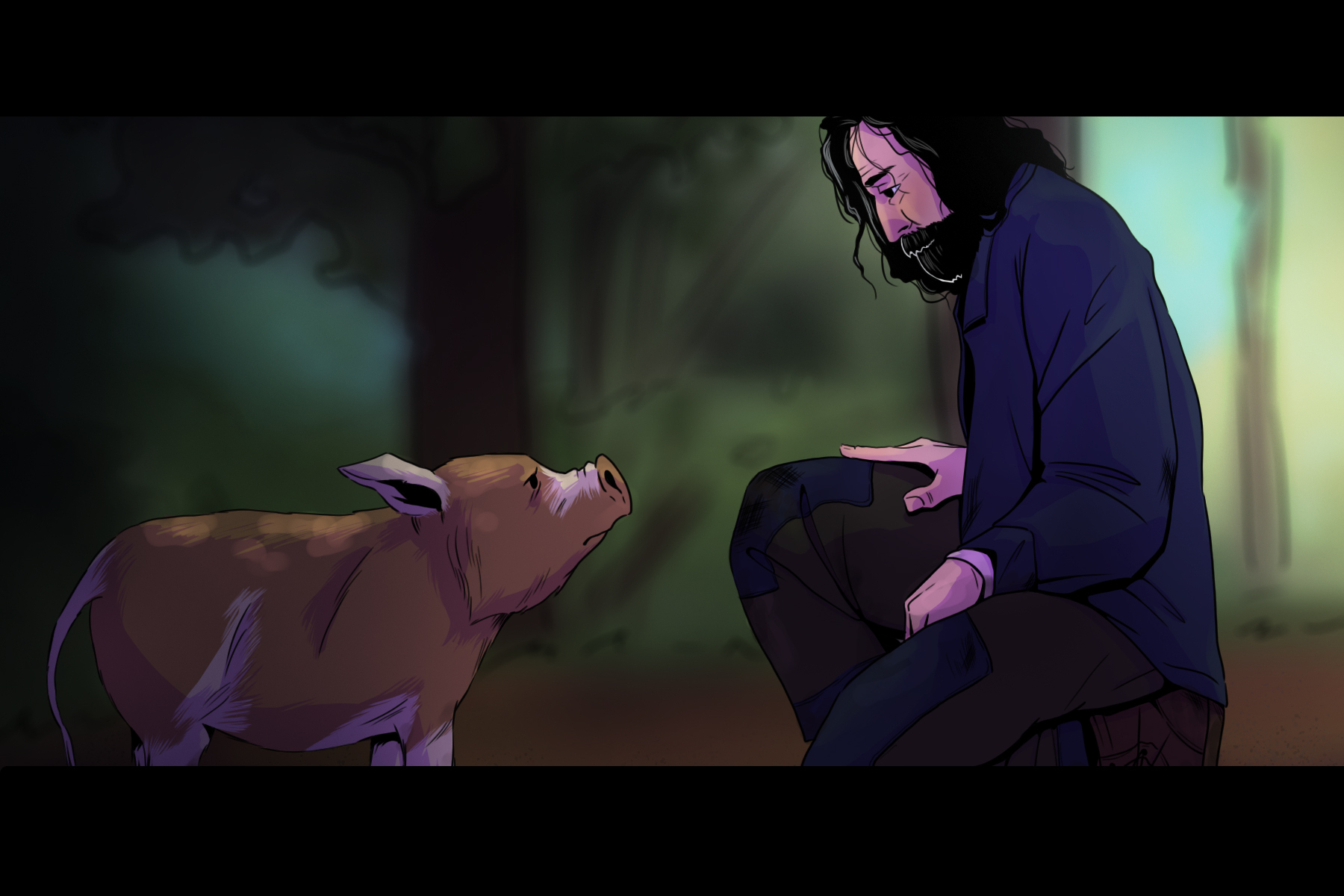“Pig” bravely fulfills first-time director Michael Sarnoski’s vision of making a movie that jumps out of viewers’ boxes. The problem is that it doesn’t say much that viewers haven’t heard already, and what little it does say isn’t said particularly artfully. For viewers craving to uncover intense emotions and ponder the futility of life, “Pig” is a must-see. For the typical American audience hungry for meaning and happy endings, however, the movie’s greatest strengths are minutely detailed visuals, incredible acting and a unique — if unsatisfactory — plot.
Though “Pig” is rife with unadulterated nonconformity, its premise is straightforward. Rob, an isolated hermit played by Nicholas Cage, makes his living by hunting truffles with his pig and selling them to an elite restaurant owner named Amir, played by Alex Wolff. This weekly encounter is Rob’s only form of social contact, and it largely consists of a few banalities, lots of silence and a clear sense of tension between the two.
When unfamiliar fists break through the door, knock Rob out and snatch Pig away in the night, Rob abandons his shack outside Portland to stalk the city itself, navigating its layers with the same focus and intuition of the cougars that once surrounded him outside the city.
Decidedly un-cougar-like, however, is Amir, the wealthy restaurant owner who barters for Rob’s truffles every week. Amir reluctantly agrees that finding the pig is financially responsible, but is so preoccupied with his own reputation that he comes off like an insecure frat boy, full of questions along the lines of “What do you think you’re doing?”
With the aid of Amir’s yellow Camaro, Amir and Rob explore Sarnoski’s exaggerated and delectable Dickensian vision of Portland, brimming with hyper-pretentious owners and chefs and a (literally) underground network of restaurant workers who claim status in a much more guttural way. This enticing, grungy and flamboyant world exists in stark contrast to wealthy Portland, which Starnoski filters bright white.
In these sensory details, “Pig” plays to its strength — its aesthetic attention to detail. Portland is a kind of heartless maze, but the hills and mountains beyond it rest more gently on the eyes.
Sarnoski’s overall vision of the Oregon woods is like being rocked by a mother: simple, melodic and sensory. In “Pig,” the woods are imbued with comfort and peace, a feeling that is reinforced by subtle sound cues and music — or the lack thereof. In multiple pans over the tops of the pine trees, audiences only experience the twittering of birds, uninterrupted by man-made sound. In another nature scene, an orchestra dreamily recalls a simple, melodic lullaby.
Unlike in the woods, silence in Portland only increases the tension. In multiple scenes, the only thing viewers hear is a knife scraping against a plate or flesh pounding flesh. In these scenes, Sarnoski doesn’t hesitate to enunciate the theme that human beings together are inherently violent. The scattered moments of punching that mark “Pig” identifies violence as a grim reality.
In moments like these, it’s clear that Sarnoski avoids the glory of violence like the plague (or modern-day COVID), running instead toward overt pedagogy and unanswerable ideas.
One of the ways “Pig” enunciates the beliefs that permeate the film is through dialogue. In one key scene, Rob psychologically deconstructs an elite chef and restaurant owner. As The New Yorker observes, in this scene, Rob “calmly, patiently, surgically insults his cooking, his restaurant, his clientele, his fame, and — underlying it all — his commercial sellout.”
Rob’s words are simple: “This isn’t real. You aren’t real,” Rob says, as Cage’s low, dusky delivery flexes its mastery. “We don’t get a lot of things to really care about.”
In these moments, Cage’s skill would immerse viewers if they weren’t already slightly stunned from Sarnoski’s ideological beating of a dead horse. “We get it,” viewers may mutter, as they watch the wildly overdrawn characterization predictably play out.
These ideological moments, however, serve a vital role in “Pig.” They hold up the movie’s plot like pillars, allowing Sarnoski’s subtler themes to stroll above them — even if those themes don’t use their privilege to go anywhere in particular.
What keeps viewers watching may be the relationship between Rob and Amir. Cage and Wolff devote the kind of energy and commitment to “Pig” that, if they were athletes instead of actors, would prompt their coach to pat them on the back and exclaim, “Way to give 110 percent!”
Cage and Amir bring life to their roles, deepening the complexity of Sarnoski’s script. In particular, Cage does what he does best through Rob: make low, guttural utterances under his breath that are terribly convincing. As The New Yorker observes, “There’s one particular and peculiar aspect of the role that Cage seems to own and that he endows with the depth and burden of his own character and experience: martyrdom.”
Amir, alongside Rob, quickly endears himself to viewers through his puppyish vulnerability. As Matt Zoller Seitz writes for Roger Ebert, “There are several stunned reaction shots of Wolff in this film that are as entrancing as whatever Cage was doing to trigger that look, because Wolff is such a good listener that somehow you can feel him absorbing what’s happening in a scene even when the camera isn’t on him.”
These over-achieving stars, as well as their supporting cast, almost make “Pig” a satisfying watch. However, Sarnoski’s drawn-out and offbeat plot falls into the common pitfalls of straw men and thematic inconsistency.
Despite Cage’s amazing acting, Rob isn’t believable. He is exemplary of the “strong, silent” archetype, revealing his capacity for physical and emotional weakness without ever being proven wrong about anything. And Amir and others like him are straw men, representing shallow, insecure elitists.
The end of the movie leaves us with little more than the beginning, prompting the inevitable question: “What’s the point?” Perhaps that is because Sarnoski himself begins his exploration with no hope of finding clarity by the end. His themes are genuine and interesting, but incomplete.
Sarnoski expounds on the heart behind the film with Dread Central, laying out an idea that sounds at face value like a great premise for a movie: “I was at a place in my life where I was seeing what grief had done to the people around me. … I was interested in exploring how loss can shape how we see the world and interact with other people in the long term.” His fascination would compel a good research paper, but Sarnoski fails to write anything meaningful — perhaps because he did not bother to search beyond his own experience.
By the end of “Pig,” viewers fall back on the simple wisdom they knew already: Life is futile and there’s no compelling reason to recover from loss. This assessment addresses the reality of life, but neglects part of that reality: the necessity and self-proving reality of hope.
If “Pig” leaves viewers with anything, it’s that the best way to deal with loss is to be authentic. Sarnoski’s advice doesn’t sound particularly good for viewers’ mental health, however — the themes of his film impart despair rather than healing. In fact, though compelling, “Pig” ultimately presents no watertight reason to avoid the very shallowness and facade it critiques.
















